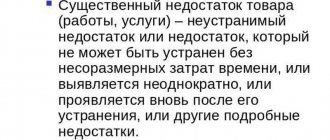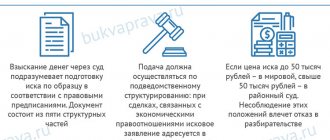Home / Complaints, courts, consumer rights
Back
Published: October 29, 2018
Reading time: 4 min
0
196
The conflict between the seller and the client cannot always be resolved through a claim settlement. In this case, you should go to court.
- Consumer protection lawyer: what questions to contact?
- Activities of a consumer rights lawyer Why you should seek the services of a lawyer
To achieve the desired result, you need to have a large amount of knowledge, understand judicial practice and how the judicial system works.
Hiring the services of a lawyer specializing in consumer rights violations will save time and nerves.
General provisions
In general, consumer protection problems are conditionally divided into the following categories :
- Direct violations committed by suppliers of goods and services in this area;
- A small number of highly specialized lawyers who practice in this area;
- Not every municipality has interdepartmental commissions that protect consumer rights;
- Lack of public organizations that would counteract unscrupulous manufacturers and suppliers;
- Legal nihilism, citizens’ ignorance of their own rights;
- Lack of a widespread culture of seeking and receiving information about the quality of a product or service.
All these problems are solved comprehensively, they take time. But a person’s understanding of the rights granted to him, methods of protection and guarantees from the state is what a consumer rights lawyer can tell. Some numbers that indicate the scale of the problem:
- A third of Russian citizens encounter disruptions in everyday life - in stores, markets, transport, healthcare, public utilities and the service sector;
- Only 26% of victims (that is, one in four) are ready to defend their rights;
- And only 11% seek qualified legal assistance.
Conclusion: 74% of those affected by the actions of sellers/suppliers of goods and services find themselves defenseless, another 15% try to solve the problem on their own by studying the current legislation. This situation provokes violators to further violate consumer rights .
The largest percentage of victims (36%) in such cases are residents of Moscow and St. Petersburg. Almost every third of them face a repetition of the violation almost every month. A third of them are in the retail sector. The same number is in the field of medicine and the provision of public services.
If you can still give up on a refusal to return goods, then poor quality housing and communal services and medicine directly affects the lives and health of citizens. And if insufficiently warm radiators or water are phenomena that can be eliminated on their own, then incorrect treatment has a negative impact on the patient, and it is difficult to correct the consequences.
The trend in this direction is alarming. Thus, according to Rospotrebnazor, its structures received complaints:
- In 2010 - about 360 thousand.
- In 2020 – about 700 thousand.
Over the past year, the number of consumer rights violations in the healthcare sector has increased by a third. The trend is associated with a sharp increase in private clinics.
Judicial protection of consumer rights
Protection of consumer rights can be carried out in various forms: recovery of losses, collection of penalties and other penalties, enforcement of obligations in kind, bringing to administrative liability. Let's consider the provisions of Art. 17 of the Law of the Russian Federation “On the Protection of Consumer Rights,” which establishes the right to judicial protection of the consumer in case of violation of his rights by the seller, manufacturer, or performer.
In accordance with Art. 17 of the Law of the Russian Federation dated 02/07/1992 N 2300-1 “On the Protection of Consumer Rights” (hereinafter referred to as Law N 2300-1), the protection of consumer rights is carried out by the court. Cases on the protection of consumer rights belong to the category of civil cases, and the procedure for their proceedings in all courts of the Russian Federation is determined by the Civil Procedure Code of the Russian Federation (Civil Procedure Code of the Russian Federation) and Law N 2300-1.
The court initiates a civil case based on your citizen’s statement of claim or on the application of the organization to which they applied to protect their rights. Any citizen has the right, in accordance with the procedure established by law, to apply to court for the protection of violated rights.
A statement of claim for the protection of consumer rights may be filed by consumers of their choice in the court at the place:
location of the organization, and if the defendant is an individual entrepreneur, his residence;
residence or stay of the plaintiff;
conclusion or execution of a contract.
If a claim against an organization arises from the activities of its branch or representative office, it may be brought to court at the location of its branch or representative office. The statement of claim is submitted to the court in writing.
Based on Art. 131 of the Code of Civil Procedure of the Russian Federation, the statement of claim must indicate:
name of the court to which the application is filed;
the name of the plaintiff, his place of residence or, if the plaintiff is an organization, its location, as well as the name of the representative and his address, if the application is submitted by a representative;
the name of the defendant, his place of residence or, if the defendant is an organization, its location;
what is the violation or threat of violation of the rights, freedoms or legitimate interests of the plaintiff and his demands;
the circumstances on which the plaintiff bases his claims and evidence supporting these circumstances;
the price of the claim, if it is subject to assessment, as well as the calculation of the collected or disputed amounts of money;
information about compliance with the pre-trial procedure for contacting the defendant, if this is established by federal law or provided for by the agreement of the parties;
list of documents attached to the application.
The statement of claim must be signed by the plaintiff or his representative in the prescribed manner.
In accordance with paragraph 3 of Art. 17 of Law N 2300-1, when filing claims for the protection of violated rights, the consumer is exempt from paying state duty on the basis of Art. 333.36 Tax Code of the Russian Federation.
As follows from Art. 46 of Law N 2300-1, in defense of an indefinite number of consumers, only claims of a non-property nature (i.e. not related to the collection of any amounts) can be filed, the purpose of which is to recognize the actions of the seller (performer, manufacturer, authorized organization or authorized individual entrepreneur, importer) illegal in relation to all consumers (both those who have already entered into an agreement and those who only intend to enter into an agreement with this business entity) and the termination of such actions.
In case of violation of consumer rights established by Law N 2300-1, which were not satisfied voluntarily by the seller (performer, manufacturer, authorized organization or authorized individual entrepreneur, importer), the court collects a fine from the defendant, regardless of whether such a demand was made.
When deciding to collect a fine, the court in the operative part of the decision indicates the transfer of 50% of the amount of this fine in favor of the public association of consumers (their association, union) that filed the claim in the interests of the consumer, or a local government body, if the claim was filed in the interests of the consumer by this organ.
Invalidity of contract terms that infringe consumer rights
When resolving disputes regarding the protection of consumer rights, it is necessary to keep in mind that the terms of the contract that infringe on the rights of consumers in comparison with the rules established by federal laws or other regulatory legal acts of the Russian Federation in the field of consumer protection are declared invalid.
If, as a result of the execution of a contract that infringes on the consumer’s rights, he incurs losses, they are subject to compensation by the manufacturer (performer, seller, authorized organization or authorized individual entrepreneur, importer) in full.
Significant deficiencies in the work performed (service provided) and other deviations from the terms of the contract, giving the consumer the right to refuse to perform the contract and demand full compensation for losses, should be understood as irreparable deficiencies or deficiencies that cannot be eliminated without a disproportionate amount of time, or are identified repeatedly, or appear again after their elimination, or other similar deficiencies.
Losses are subject to compensation by the manufacturer (performer, seller) in full if they arose as a result of the execution of a contract that infringes on the rights of the consumer.
An invalid transaction is an imaginary, voidable or void transaction. The participants in such a transaction are obliged to return to the other party all property received under the transaction, or reimburse its value in monetary equivalent.
The issue of the legality of the transaction is resolved in accordance with Art. 180 of the Civil Code of the Russian Federation, according to which the invalidity of part of a transaction does not entail the invalidity of its other parts, if it can be assumed that the transaction would have been completed without the inclusion of its invalid part. If we assume that the transaction would not have taken place without the inclusion of invalid terms, it is considered invalid as a whole.
Some rights of consumers in the field of trade and other types of services, which are of practical importance and are often violated, are defined more specifically by Law N 2300-1. These rights include the right to freely choose goods (work, services). This means that any product in the store must be sold, and any service related to the performer’s profile must be provided at the consumer’s request. Therefore, the choice must be truly free, without direct or indirect coercion. It is prohibited to condition the acquisition of some goods (services) on the mandatory acquisition of others.
According to the Rules for the sale of certain types of goods, a list of durable goods that are not subject to the buyer’s requirement to provide him with a similar product free of charge for the period of repair or replacement, and a list of non-food products of proper quality that cannot be returned or exchanged for a similar product of a different size, shape, size, style, color or configuration, approved by Decree of the Government of the Russian Federation of January 19, 1998 N 55, in the case of delivery of large-sized goods by the buyer, the seller is obliged to ensure loading of the goods onto the buyer’s vehicle free of charge.
In accordance with paragraph 7 of Art. 18 of Law N 2300-1, this rule can be extended to goods weighing more than 5 kg. For the same reasons, if the seller fails to fulfill his loading obligations, the buyer has the right to carry it out at his own expense, and the seller is obliged to reimburse him for the expenses incurred.
Compensation for moral damage
As defined in Art. 151 of the Civil Code of the Russian Federation, moral harm is understood as physical or moral suffering caused to a citizen by actions that violate his personal non-property rights and other intangible benefits.
For the right to compensation for moral damage to arise, the following conditions must be present simultaneously:
the citizen suffering moral harm, i.e. physical or mental suffering;
an unlawful action (inaction) of the harm-doer that violates the citizen’s non-property rights or encroaches on other intangible benefits belonging to the citizen;
a causal relationship between an unlawful action (inaction) and moral damage;
the fault of the harm-doer.
Causes of harm in accordance with Art. 15 of Law N 2300-1 there can be manufacturers (performer, seller, authorized organization or authorized individual entrepreneur, importer). Thus, compensation for moral damage can be directly assigned to each of these persons, who, in turn, are responsible for causing moral damage to the consumer as a result of their own actions (inaction) that are not part of the functions assigned to them under the contract with the manufacturer or the seller of the goods.
The responsibility to prove the absence of guilt lies with the inflictor of moral harm. He may also be released from liability if he proves that moral damage was caused by a violation of consumer rights caused by force majeure.
The amount of compensation for moral damage is determined by the court and does not depend on the amount of compensation for property damage, losses and other property claims.
The moral damage caused is compensated in monetary form. The amount of compensation is determined by agreement of the parties, and in case of a dispute - by the court and does not depend on the amount of compensation for property damage.
According to Art. 151 of the Civil Code of the Russian Federation, when determining the amount of compensation for moral damage, the court takes into account the degree of guilt of the offender and other circumstances worthy of attention. The court must also take into account the degree of physical and mental suffering associated with the individual characteristics of the person who suffered harm.
When determining the amount of compensation for harm, the requirements of reasonableness and fairness must be taken into account. The amount of compensation for moral damage depends on the nature and extent of moral or physical suffering caused to the plaintiff, the degree of guilt of the defendant in each specific case, other noteworthy circumstances and cannot be made dependent on the size of the satisfied claim for compensation for material harm, losses and other material claims.
The manufacturer (executor, seller, authorized organization or authorized individual entrepreneur, importer) is exempt from liability for failure to fulfill obligations or for improper fulfillment of obligations if he proves that the failure to fulfill obligations or their improper fulfillment occurred due to force majeure, as well as on other grounds provided for by the Law N 2300-1 (clause 4 of article 13 of Law N 2300-1).
Force majeure refers to extraordinary and unavoidable circumstances under given conditions. These include earthquakes, floods, droughts and similar natural phenomena, as well as social phenomena (wars, epidemics, large-scale strikes, declaration of quarantine) (Article 401 of the Civil Code of the Russian Federation). In Art. 401 lists some circumstances that cannot be classified as force majeure: violation of obligations on the part of the debtor’s counterparties, lack of goods on the market necessary to fulfill the obligation, lack of necessary funds.
Based on Part 1 of Art. 212 of the Code of Civil Procedure of the Russian Federation, the court has the right to apply for immediate execution a decision in cases related to the protection of consumer rights only at the initiative of the plaintiff and only if, due to special circumstances, a delay in its execution may lead to significant damage to the claimant or execution may be impossible. The plaintiff must provide evidence confirming the existence of circumstances that necessitate immediate execution of the decision. The question of the need for immediate execution of such a decision should be discussed by the court simultaneously with the adoption of a decision on the case.
When might you need help with STD issues?
It is recommended to contact qualified specialists in advance. Based on the above statistics, the risk that the rights of any citizen-consumer will be violated is 33%. And the fact that such violations will have to be faced monthly is 11%. Therefore, it is better to ask questions about consumer protection in advance in order to know how to act in the event of dishonest actions of the seller/supplier.
In general, legal assistance from a lawyer can be obtained from:
- In the consumer market department of a local government body;
- In the Society for the Protection of Consumer Rights;
- In Rospotrebnadzor;
- From independent lawyers, lawyers.
By increasing legal literacy, these structures can be used to effectively and freely punish violators. For example, Rospotrebnadzor will not only provide advice , but also conduct the following checks:
- Sanitary and epidemiological with the appropriate conclusion.
- Seller/service provider.
If the fact of violation is confirmed, Rospotrebnadzor employees:
- A protocol on administrative violation is drawn up.
- They submit documents to the court, acting in the interests of the injured person.
The Society for the Protection of Consumer Rights provides similar , including conducting an independent examination. The consumer market department of the local government body, in addition to consultation:
- Responds to the applicant's request.
- Sends an application to the court, acting in the interests of the victim.
But it is better to have an initial consultation with independent lawyers. When providing free assistance, the specialist will indicate the algorithm for contacting each of the above authorities:
- how correct;
- in what order?
- with what documents?
By doing otherwise, the affected person risks receiving a formal response or general advice that does not solve his problem. If this procedure is violated, the assistance of a consumer rights lawyer can be obtained at any time, even at the stage of legal proceedings.
Get a free consultation
You can contact me for advice on consumer protection issues.
You can get advice in the following ways:
- Free phone conversation
- A personal meeting
- Fill out the application form
It is necessary to take into account that if you leave your question in a special online form on the website in advance, my assistance to you will be more productive. Thanks to this, I will be able to analyze the situation in advance so that at the subsequent meeting I can voice a well-thought-out legal position on your issue.
Free lawyer: online, by phone and in person
When turning to legal experts, consumers make several mistakes that reduce the effectiveness of the assistance they receive, namely:
- They explain the situation emotionally, ignoring or omitting facts and key points.
- They do not provide supporting documents.
All checks, receipts, certificates of work performed and other official papers confirming the purchase of goods, services, and their provision must be saved until the end of the warranty period.
Therefore, it is recommended to request a free consultation in advance, during which a consumer protection lawyer will indicate:
- What to look for when shopping.
- What to ask from the seller/supplier and how to keep it.
- How to act if violations are detected.
If the injured person does not have any preliminary preparation, then he will have to:
- Contact legal forums and websites where a similar problem is considered and discussed;
- Familiarize yourself with the material, go to the rules of law indicated on the topic and try to understand what is written in them;
- Based on the data obtained, formulate a question that will be asked during the consultation.
The interpretation of legal norms by an unprepared person will most likely be erroneous. Therefore, there is no need to make hasty conclusions .
Once the question is ready, you need to:
- Write it down electronically.
- Take electronic photographs (scans) of documents that relate to the circumstances stated in the question.
The question is written briefly and in abstracts. There is no need to draw up a statement of claim or write a 2-3 page story. It is recommended that the text size does not exceed half an A4 page.
Next comes the actual consultation . You can get it for free:
- online;
- by phone;
- through a face-to-face appointment at a lawyer’s office.
In the first case it is necessary:
- Enter the query “protection of consumer rights online consultation for free” in the search bar of your browser.
- Select 20-30 sites that provide such assistance and copy them into a separate file.
- Go to each of these web resources and copy a pre-prepared question into the form and upload pictures of documents.
- Systematize the answers received and analyze them.
The algorithm of actions on the phone is similar, you just need to search. The problem will have to be voiced during the call. If a specialist wants to get acquainted with the documents, you need to check his email address and send pre-prepared photographs to it.
A face-to-face appointment is necessary if:
- The case is complex, there are a lot of documents on it;
- Online and telephone consultations were not very successful;
- Help is needed urgently; waiting for a response by phone or mail is not an option.
It is recommended to prepare for it according to the algorithm described above. Prepared scans of documents allow you to:
- Do not leave original evidence in the case;
- Within a few days, seek help from 5-10 or more lawyers.
In general, you can combine seeking free help by sending messages online, making calls and visiting the offices of law firms. But in order to increase the effectiveness of this assistance, it is necessary to go through the preparatory stage as indicated above.
Case resolution experience
In the spring-summer of 2020, the Capital District Court considered the claim of the Society for the Protection of Consumer Rights against an organization engaged in retail trade. Requirements submitted by the applicant:
- Recognize as illegal the actions of the defendant in relation to an indefinite number of persons to whom products with an expired expiration date were sold and refused to provide information.
- Stop such actions.
- Collect court costs and legal fees.
During the court hearings, it turned out that the defendant had previously been found to have committed similar violations during inspections. Written evidence of this has been provided by the plaintiff. Based on the results of the consideration of the case, the court decided to partially satisfy the claim:
- The defendant's actions were recognized as illegal;
- The store administration was ordered to stop such sales and refusal to provide information;
- Costs for court and legal expenses are satisfied only in the amount of 7 thousand rubles.
In refusing to reimburse the applicant for the full amount that was spent on legal fees, the court drew attention to the incompleteness of evidence that such an amount was spent. The above 7 tr. were determined based on considerations of the representative of Themis and the principle of sufficiency.
In this case, the defendant defended himself through testimony. Thus, store employees were heard who claimed that there was no trade in expired products. However, the court cast doubt on this testimony, since all the witnesses are interested parties.
In this case, assistance in protecting consumer rights was received from a public organization. She completely took over the process of pre-trial and judicial resolution of the conflict between the store and customers. For the latter, such legal support was free of charge.








